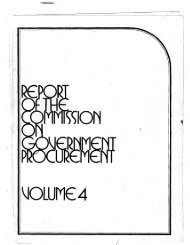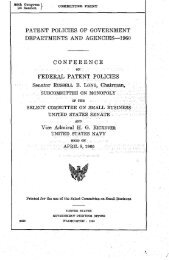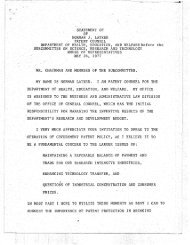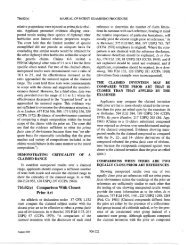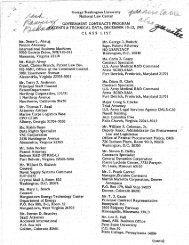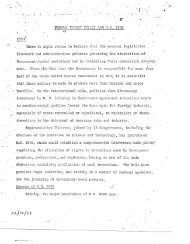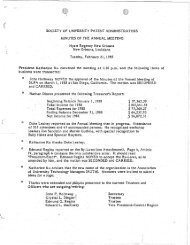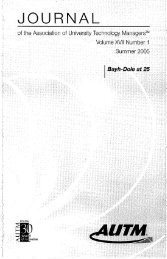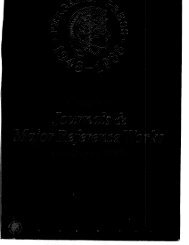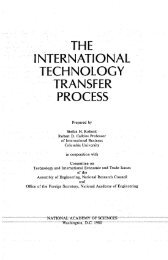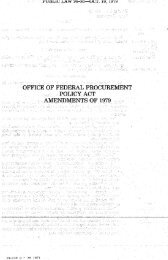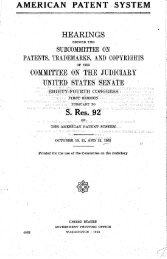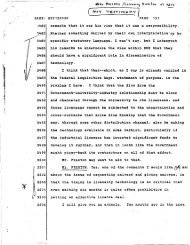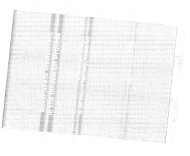The Subject Patent Already Has Underlining or ... - Bayhdolecentral
The Subject Patent Already Has Underlining or ... - Bayhdolecentral
The Subject Patent Already Has Underlining or ... - Bayhdolecentral
Create successful ePaper yourself
Turn your PDF publications into a flip-book with our unique Google optimized e-Paper software.
2010 Office Handling of Duty<br />
of Disclosurellnequitable<br />
Conduct Issues<br />
Determination of ineqnitable conduct issues<br />
requires an evaluation of the intent .of the. party<br />
involved. While some court decisions have held that<br />
intent may be inferred in some circumstances, consideration<br />
of the good faith of the party, <strong>or</strong> lack thereof,<br />
is often required. In several court decisions, a high<br />
level of proof of intent to mislead the Office was<br />
required in <strong>or</strong>der to prove inequitable conduct under<br />
37 CPR 1.56. See In re Harito, 847 F.2d 801,<br />
6 USPQ2d 1930 (Fed. Cir. 1988) and FMC C<strong>or</strong>p. v.<br />
Manitowoc Co., 835 F.2d 1411, 5 USPQ2d 1112 (Fed.<br />
Cir. 1987). <strong>The</strong> Office is not the best f<strong>or</strong>um in which<br />
to determine whether there was an "intent to mislead";<br />
such intent is best determined when the trier of<br />
facts can observe demean<strong>or</strong> of witnesses subjected to<br />
cross-examination. A. court, with subpoena power, is<br />
presently the best f<strong>or</strong>um to consider duty of disclosure<br />
issues under the present evidentiary standard f<strong>or</strong> finding<br />
an "intent to mislead." <strong>The</strong> court proceeding<br />
involves two participating adverse parties. This is not<br />
the case in the Qffice, since even "protesting" parties<br />
are not permitted to participate under. the rules. Also,<br />
it is the courts and not the Office that are in the best<br />
position to fashion an equitable remedy to fit the precise<br />
facts in those.cases where inequitable conduct is<br />
established. Furtherm<strong>or</strong>e, inequitable conduct is not<br />
set by statute as a criteria f<strong>or</strong> patentability but rather is<br />
a judicial application of the doctrine ofunclean hands<br />
which is appropriate to be handled by the courts rather<br />
than by an administrative body. Because of the lack of<br />
tools in the Office to deal with this issue and because<br />
of its sensitive nature and potential impact on a patent,<br />
Office determinations generally will notdeter .subsequent<br />
litigation of the same issue in the courts on<br />
appeal <strong>or</strong> in separate litigation. Office determinations<br />
would significantly add to the expense and time<br />
involved in obtaining a patent with little <strong>or</strong> no benefit<br />
to the patent owner <strong>or</strong> any other parties with an interest.<br />
Acc<strong>or</strong>dingly, the Office does not investigate and<br />
reject <strong>or</strong>iginal <strong>or</strong> reissue applications under 37 CPR<br />
1.56. Likewise, the Office will not comment upon<br />
duty of disclosure issues which are brought to the<br />
attention of the Office in <strong>or</strong>iginal <strong>or</strong> reissue applica-<br />
DUTY OF DISCLOSURE 2012<br />
tions except to note in the application, in appropriate<br />
circumstances, that such issues are no longer considered<br />
by the Office during its examination of patent<br />
applications. Examination of lack of deceptive intent<br />
in reissue applications will continue but without any<br />
investigation of inequitable conduct issues. Applicant's<br />
statement of lack ofdeceptive intent n<strong>or</strong>mally<br />
will be accepted as dispositive except in special circumstances<br />
such as an admission <strong>or</strong> judicial determination<br />
of fraud <strong>or</strong> inequitable conduct. See MPEP<br />
§ 2022.05.<br />
2012 Reissue Applications Involving<br />
Issues ofFraud, Inequitable<br />
Conduct, and/<strong>or</strong> Violation of<br />
Duty of Disclosure<br />
Questions of "fraud," "inequitable conduct," <strong>or</strong><br />
violation of "duty of disclosure" <strong>or</strong> "cand<strong>or</strong> and<br />
good faith" can atise in reissue applications.<br />
REQUIREMENT FOR "ERROR WITHOUT<br />
ANY DECEP'l'IVE INTENTION"<br />
Both 35 U.S.c. 251 and 37 CFR 1.175 promulgated<br />
pursuant thereto require that the err<strong>or</strong> must have<br />
atisen "without any deceptive intention." In re Heany,<br />
1911 C.D. 1}8, 180 (1911), unequivocally states:<br />
Where such a condition [fraudulent <strong>or</strong> deceptive intention]<br />
is shownto exist theright to reissuethepatent is f<strong>or</strong>feited.<br />
Similarly, the courtin In re Clark, 522 F.2d 623,<br />
627, 187 USPQ 209, 213 (CCPA 1975) indicated:<br />
Reissue is not available to rescue a patentee who had<br />
presented claims.limited to.avoid particular pri<strong>or</strong> art and<br />
thenhadfailed to disclose that pri<strong>or</strong> art . . , after that failure<br />
to disclose has resulted in invalidating of the claims.<br />
It is clear that "fraud" cannot be purged through the<br />
reissue process. See conclusions of Law 89 and 91 in<br />
Intermountain Research and Eng'g Co. v. Hercules<br />
Inc., 171 USPQ 577, 631-32 (C.D. Cal. 1971).<br />
Clearly, where several patents <strong>or</strong> applications stem<br />
from an <strong>or</strong>iginal application which contained fraudulent<br />
claims ultimately allowed, the doctrine ofunclean<br />
hands bars allowance <strong>or</strong> enf<strong>or</strong>cement of any of the<br />
claims of any of the applications <strong>or</strong> patents. See Keystone<br />
Driller Co. v. General Excavat<strong>or</strong> Co., 290 U.S.<br />
240, 245, 19 USPQ228, 230 (1933); East Chicago<br />
2000-11 August2001



